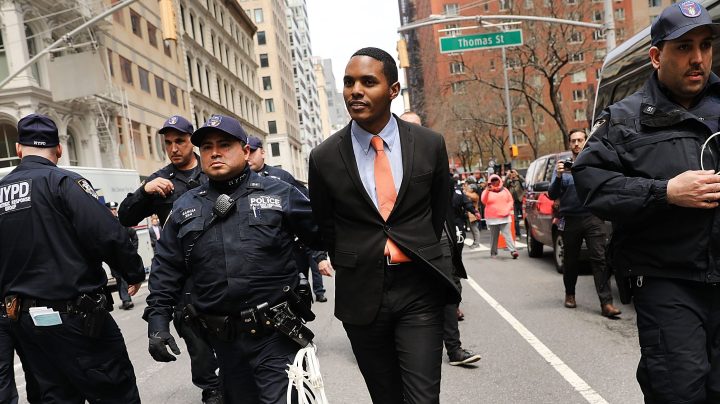Ritchie Torres Speaks Out on Colorism, ‘Antiquated’ Congressional Rules & More

New York City Council Member Ritchie Torres is arrested with other activists at a rally demanding that the Trump administration abandon proposals to cut the Housing and Urban Development's (HUD) budget on April 20, 2017 in New York City. Photo by Spencer Platt/Getty Images
Ritchie Torres is on his way to being the first of a lot of things: He’s expected to make history as the first openly gay Afro-Latino man in Congress. However, that identification—as both Black and Latinx—presents a dilemma for his caucus politics. When it comes time to choose, Torres will have to pick between joining the Black or Hispanic caucuses. Because of what he calls “antiquated” congressional rules, he can’t join both.
Torres explained the issue he’s facing in an op-ed that ran Sunday in the Washington Post, titled, “I’m Afro-Latino, but I can’t join both the Black and Hispanic caucuses in Congress. That must change.” He argues that the rule barring him from participating in both groups is an arbitrary one that seems “especially tone-deaf in this present moment,” when the importance of intersectionality and the realities of racial identity have come to the forefront of national dialogues.
“The question of who I am racially will likely run into the binary buzzsaw of caucus politics. There is an antiquated rule that prohibits members of Congress from joining both the Congressional Black Caucus and the Congressional Hispanic Caucus,” he writes. “The wall of separation between the CBC and CHC ignores the realities of racial identity, which feels especially tone-deaf in this present moment. You have to pick a side, so to speak. You can be either Black or Latino but never both. In real life, however, I am both.”
Torres also evokes the complexities of the Afro-Latino experience, particularly under the construct of Latindad, which is filled with colorism as well as ideas of white and mestizo supremacy. “As a Black man within the Latino community, I have felt the pain of colorism, including at the hands of my own family. My Afro-Latino identity enables me to see racism intersectionally, within multiple cultures and across multiple spheres, such as the criminal justice system, education and immigration, to name but a few,” he writes.

He continues, “The very idea of intersectionality tells us to embrace the places at which identities intersect, rather than create false choices between them. I am both Black and Latino — there’s no need to artificially barricade one from the other.”
Back in June, the Bronx-born, 32-year-old councilman took the lead over Rubén Díaz Sr., a pentecostal minister with conservative leanings, during the race for the 15th Congressional District. He has decided to wait until the results of his primary are officially certified before declaring victory. While his election is seen as a progressive win, Torres has been criticized by police reform groups, who say that he worked with Mayor Bill de Blasio to water down the 2017 Right to Know Act. He’s also been the subject of controversy for calling himself “the embodiment of a pro-Israel progressive.”